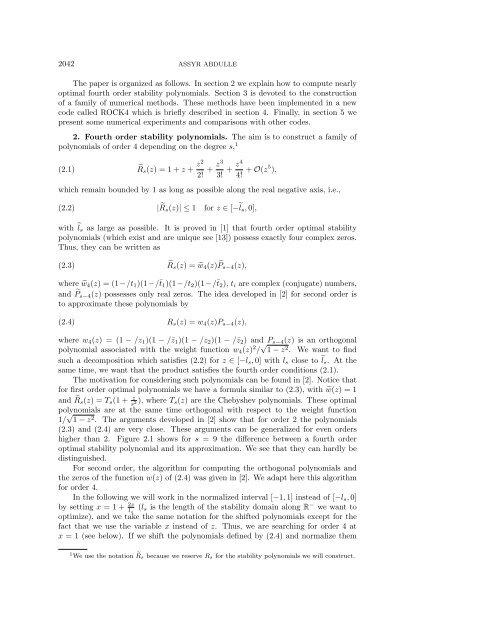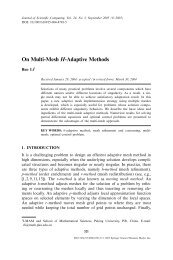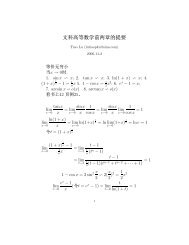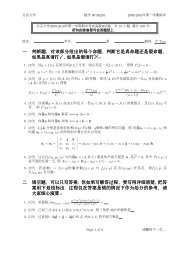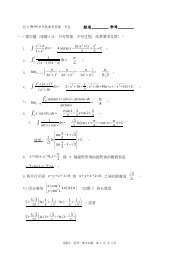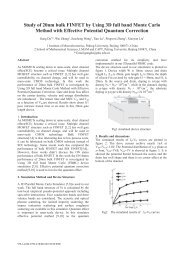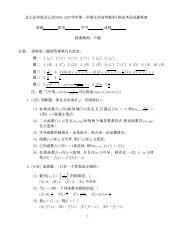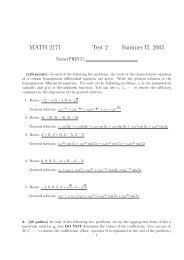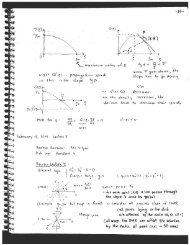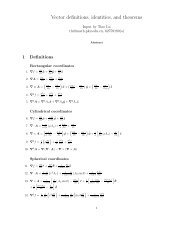fourth order chebyshev methods with recurrence relation
fourth order chebyshev methods with recurrence relation
fourth order chebyshev methods with recurrence relation
You also want an ePaper? Increase the reach of your titles
YUMPU automatically turns print PDFs into web optimized ePapers that Google loves.
2042 ASSYR ABDULLE<br />
The paper is organized as follows. In section 2 we explain how to compute nearly<br />
optimal <strong>fourth</strong> <strong>order</strong> stability polynomials. Section 3 is devoted to the construction<br />
of a family of numerical <strong>methods</strong>. These <strong>methods</strong> have been implemented in a new<br />
code called ROCK4 which is briefly described in section 4. Finally, in section 5 we<br />
present some numerical experiments and comparisons <strong>with</strong> other codes.<br />
2. Fourth <strong>order</strong> stability polynomials. The aim is to construct a family of<br />
polynomials of <strong>order</strong> 4 depending on the degree s, 1<br />
Rs(z) =1+z + z2 z3 z4<br />
+ +<br />
2! 3! 4! + O(z5 (2.1)<br />
),<br />
which remain bounded by 1 as long as possible along the real negative axis, i.e.,<br />
(2.2)<br />
| Rs(z)| ≤1 for z ∈ [− ls, 0],<br />
<strong>with</strong> ls as large as possible. It is proved in [1] that <strong>fourth</strong> <strong>order</strong> optimal stability<br />
polynomials (which exist and are unique see [13]) possess exactly four complex zeros.<br />
Thus, they can be written as<br />
(2.3)<br />
Rs(z) = w4(z) Ps−4(z),<br />
where w4(z) =(1−/t1)(1−/¯t1)(1−/t2)(1−/¯t2), ti are complex (conjugate) numbers,<br />
and Ps−4(z) possesses only real zeros. The idea developed in [2] for second <strong>order</strong> is<br />
to approximate these polynomials by<br />
(2.4)<br />
Rs(z) =w4(z)Ps−4(z),<br />
where w4(z) =(1− /z1)(1 − /¯z1)(1 − /z2)(1 − /¯z2) and Ps−4(z) is an orthogonal<br />
polynomial associated <strong>with</strong> the weight function w4(z) 2 / √ 1 − z 2 . Wewanttofind<br />
such a decomposition which satisfies (2.2) for z ∈ [−ls, 0] <strong>with</strong> ls close to ls. At the<br />
same time, we want that the product satisfies the <strong>fourth</strong> <strong>order</strong> conditions (2.1).<br />
The motivation for considering such polynomials can be found in [2]. Notice that<br />
for first <strong>order</strong> optimal polynomials we have a formula similar to (2.3), <strong>with</strong> w(z) =1<br />
and Rs(z) =Ts(1 + z<br />
s 2 ), where Ts(z) are the Chebyshev polynomials. These optimal<br />
polynomials are at the same time orthogonal <strong>with</strong> respect to the weight function<br />
1/ √ 1 − z 2 . The arguments developed in [2] show that for <strong>order</strong> 2 the polynomials<br />
(2.3) and (2.4) are very close. These arguments can be generalized for even <strong>order</strong>s<br />
higher than 2. Figure 2.1 shows for s = 9 the difference between a <strong>fourth</strong> <strong>order</strong><br />
optimal stability polynomial and its approximation. We see that they can hardly be<br />
distinguished.<br />
For second <strong>order</strong>, the algorithm for computing the orthogonal polynomials and<br />
the zeros of the function w(z) of (2.4) was given in [2]. We adapt here this algorithm<br />
for <strong>order</strong> 4.<br />
In the following we will work in the normalized interval [−1, 1] instead of [−ls, 0]<br />
by setting x =1+ 2z<br />
ls (ls is the length of the stability domain along R − we want to<br />
optimize), and we take the same notation for the shifted polynomials except for the<br />
fact that we use the variable x instead of z. Thus, we are searching for <strong>order</strong> 4 at<br />
x = 1 (see below). If we shift the polynomials defined by (2.4) and normalize them<br />
1 We use the notation Rs because we reserve Rs for the stability polynomials we will construct.


